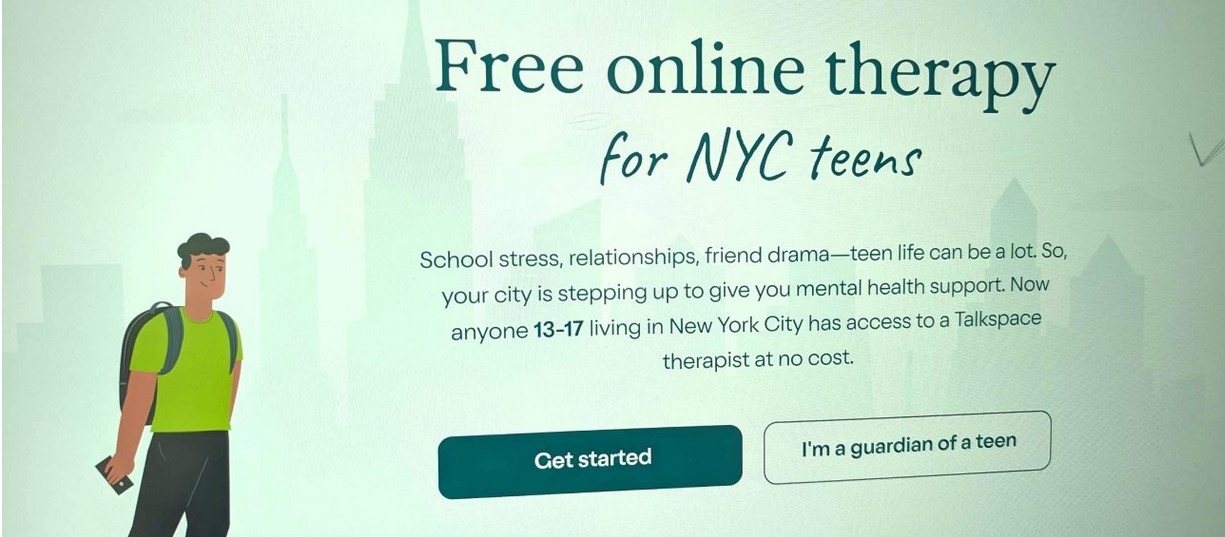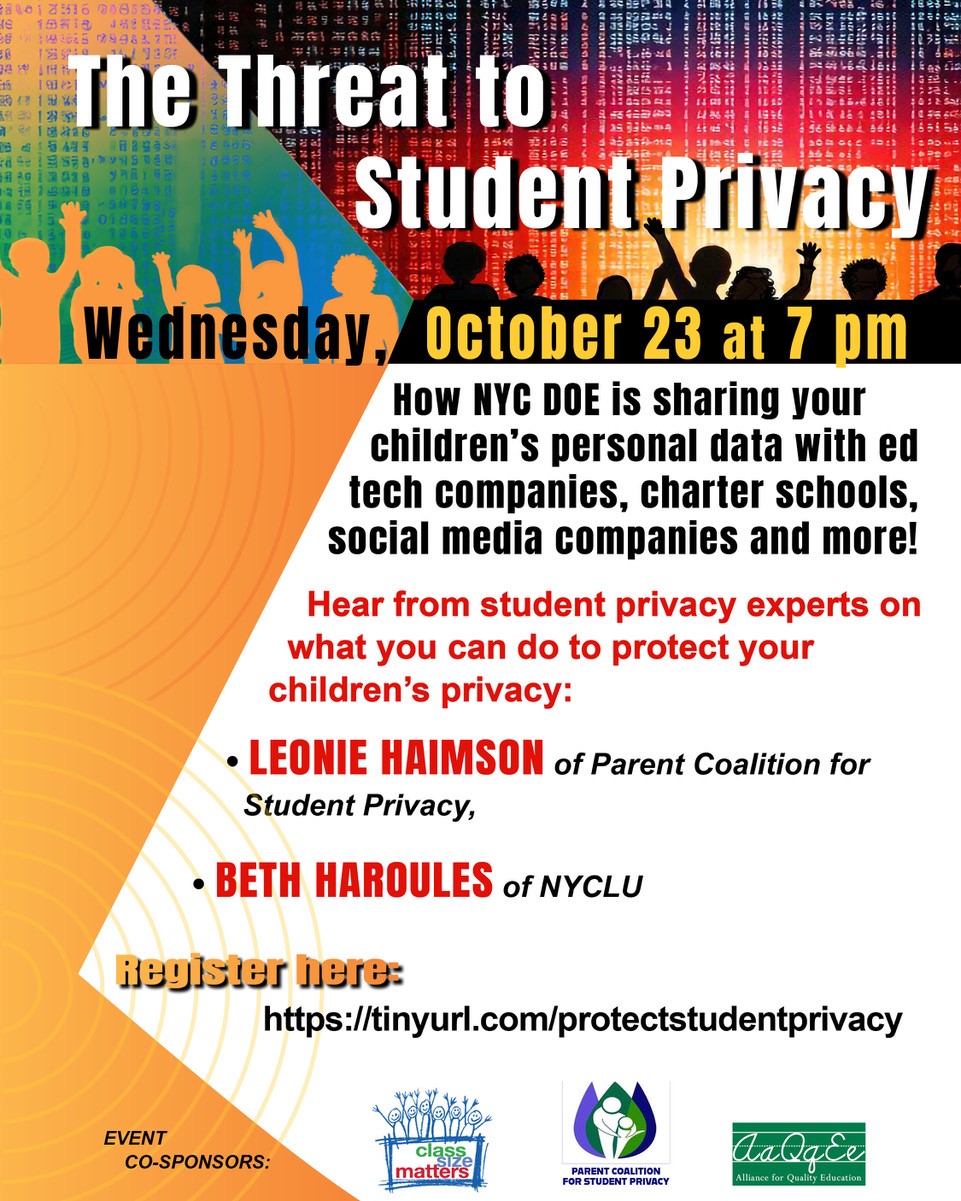On Wed. October 23, 2024 at 7 PM ET, we’ll be briefing parents on how they can better protect their children’s data — mostly aimed at NYC parents and teachers, but we’ll give tips useful nationwide. Register today here.
Our follow-up letter to the City, reaffirming our concerns with Teenspace violations of student privacy
Oct. 17, 2024
On Sept. 10, along with NYCLU and AI for Families, we wrote the Mayor, the DOE Chancellor, and the Commissioner of Health about our deep concerns with the way in which the online mental health company Teenspace allows for the sharing of personal information with unnamed third parties for marketing purposes in a manner that would be illegal if the contract was signed by the DOE rather than the Dept. of Health. Their parent company, Talkspace, is being paid $26 million over three years by the city to provide free counseling to students, and the Mayor, the Commissioner of Health and the DOE have all been aggressively encouraging NYC students to sign up for these services, with no mention of how their personal data may be used for predatory marketing and other commercial purposes which could further undermine their mental health. More on this here.
On Sept. 23, Dept. of Health responded, arguing that they did not have to abide by the state student privacy law since they were not an education agency, but assuring us that their contract was no less protective. On Oct. 8, we received the Talkspace contract via a Freedom of Information Law request.
The contract did not dispel our concerns. Since we sent our initial letter, we had discovered that when a NYC student visits the Teenspace website on their phone, their personally identifiable information is shared with 15 ad trackers and 34 cookies, as well as Facebook, Amazon, Meta, Google, and Microsoft among other companies, which we saw from using the Blacklight privacy audit tool. These findings were later confirmed by a security company that does privacy analyses. These findings are particularly concerning, given how the city is suing many of these companies for undermining children’s mental health and designing their platforms to be addictive in order to maximize their revenues via targeted advertising.
Our follow-up letter to the Dept. of Health is here and below, copied to other city officials. If you’d like to hear more about Teenspace and other threats to student privacy, please attend our privacy briefing on Wed. October 23 at 7 PM EST; you can register here.
NYCLU PCSP & AIF response to DOHMH regarding Teenspace privacy violations 2024.10.16Our comments to the Attorney General on how to regulate the NY Child Data Protection Act
Sept. 23, 2024
See here and below; our comments to the Attorney General’s office on how to implement regulations for the Child Data Protection Act, passed by the NY State Legislature in June 2024, so that it doesn’t inadvertently weaken student privacy and instead strengthens the privacy of children and teens, in and out of schools.
For more on the AG’s request for comments see their website here. The deadline is September 30, 2024 to be sent to ChildDataProtection@ag.ny.gov
If you’d like to send in your own comments, here is a sample message:
As a parent [or teacher], I support the comments provided by the Parent Coalition for Student Privacy and urge you to make it clear in the CDPA regulations that 1- nothing in the law should weaken the stronger student privacy protections in federal and state law, including parent consent provisions and prohibition against using student data for marketing purposes; 2- that the monetization of children’s data through transfer to third parties for commercial purposes should be prohibited just as the outright sale of that data; and 3- clear and concise privacy policies and consent documents must be required, or any consent on the part of a parent or minor cannot be meaningful.
Signed with your name, address, email
PCSP Comments on regulations to implement the CDPA 9.23.24Privacy concerns with NYC student use of Teenspace online counseling service
 Update Sept. 12, 2024: Our letter was covered by Daily News , Chalkbeat , State Scoop and K12 Dive so far. We just learned that in California a class action lawsuit was filed against Talkspace, the parent company of Teenspace, for sharing with TikTok the personal information of clients and visitors to its website, including the information of minors. We also learned that when a NYC student visits the Teenspace website on their phone, their personally identifiable information is shared with 15 ad trackers and 34 cookies, as well as Facebook, Amazon, Meta, Google, and Microsoft among other companies, which we saw from using the Blacklight privacy audit tool,.
Update Sept. 12, 2024: Our letter was covered by Daily News , Chalkbeat , State Scoop and K12 Dive so far. We just learned that in California a class action lawsuit was filed against Talkspace, the parent company of Teenspace, for sharing with TikTok the personal information of clients and visitors to its website, including the information of minors. We also learned that when a NYC student visits the Teenspace website on their phone, their personally identifiable information is shared with 15 ad trackers and 34 cookies, as well as Facebook, Amazon, Meta, Google, and Microsoft among other companies, which we saw from using the Blacklight privacy audit tool,.
note: corrected email address for Ann Williams-Isom is awilliamsisom@cityhall-nyc.gov
Sept. 10, 2024
See below and here: a letter sent today to NYC Mayor Adams, Chancellor Banks, the NYC Health Commissioner, and the Deputy Mayor for Health and Human Services. The letter was written and signed by the Parent Coalition for Student Privacy, NYCLU and AI for Families, and expresses our collective privacy concerns with the Teenspace telehealth mental health service. The city is paying $26 million for this service, which has been widely promoted by the Mayor and NYC DOE to be used by NYC students.
Teenspace is owned by a company called Talkspace and collects a huge amount of very sensitive personal information from teens before they even can create accounts or access the privacy policy – and much of this information would be barred from collection by the federal student privacy law PPRA without parental consent or opt out if the district had contracted for these services rather than the city’s Department of Health. The list of these questions is included in the appendix to our letter.
To make things worse, Talkspace says personal student data can be used for marketing purposes, which would be prohibited by the NY Student privacy law 2D, again if the DOE had signed the contract.
In 2022, several US Senators wrote to Talkspace, pointing out how the company also appeared to be taking advantage of a “regulatory gray area” in HIPAA, to exploit their patients’ data for profit.
Especially with all the breaches and misuse of student data by DOE contractors, the privacy of NYC students should be better protected than this. Finally, there have been widespread consumer complaints about Talkspace’s inadequate counseling services and overcharging of clients. All of this and more is touched on in our letter below.
No more student data sales by College Board/ACT!
May 6, 2024
No More Student Data Sales May 6 2024Here is the presentation we gave on May 6 to parents from states throughout the nation, with tips on how to ensure their children’s data is not sold by the College Board or ACT. Our spreadsheet with links to state laws where this is illegal for school vendors is here. A video of the event is available on YouTube; Part I with the presentation, and Part II, with a Q and A.
Here is a template letter that you can use to write to your State Attorney General urging them to stop these vendors from selling student data in violation of your state law, as the NY AG did, is below.
If you are an Illinois resident, here is a form to write to the Illinois AG asking him to enforce Illinois’ state student privacy law, sponsored by Illinois Families for Public Schools.
Please email us if you have any questions at: info@studentprivacymatters.org
Also contact us if you are a parent at one of the states that do not have a law prohibiting the sale of student data by the College Board/ACT, or have a state law that allows this with student consent, but without specifying the age of that student. We can help you file a FERPA complaint to the US Department of Education.
Thanks! Leonie and Cassie

